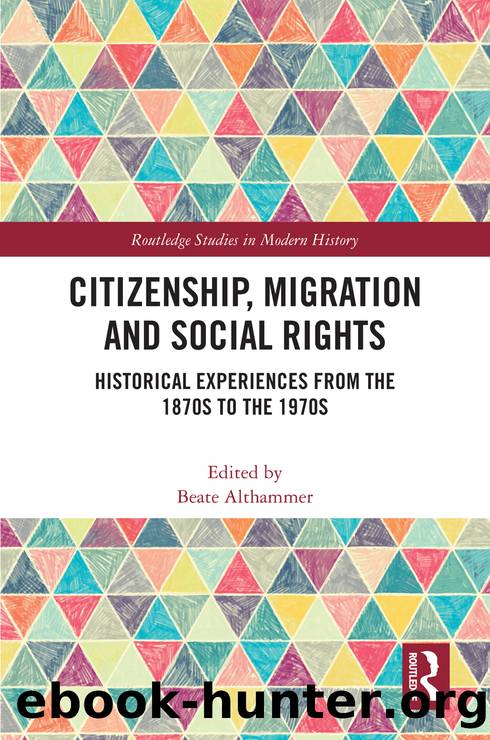Citizenship, Migration and Social Rights by Beate Althammer;

Author:Beate Althammer;
Language: eng
Format: epub
Publisher: Taylor & Francis (Unlimited)
Published: 2023-07-02T00:00:00+00:00
Migrants and mass politics
For Brentano, the desirable direction of Alsatian politics was clear. For some time before 1887, he had been advocating that the government should seek its support among the peasantry and working classes, rather than the bourgeois elites. This way, Brentano believed, the majority of the population could still be won over for the German regime. Anti-German sentiment, he argued, was âreal among the urban middle classes and upper middle classes, but fake among the mass of urban artisans and craftsmen, among farmers and among the working classesâ.45 His arguments increasingly fell on fertile ground.
In the second half of the 1880s, the German Empire began to edge towards a different political strategy in Alsace-Lorraine. In what follows, it will be argued that this change owed much to the profound demographic transformation created by mass migration. The empireâs new political strategy responded to a growing disillusion with the powers of local elites to influence local politics in the hoped-for way, to growing criticism from middle-class immigrants and, most importantly perhaps, to growing political participation of the immigrant working classes.
Scrapping alleged privileges was a first important part of this process. The government reverted on many concessions that had been intended to appease local elites and to limit emigration in the aftermath of the annexation. After his visit to Berlin in 1887, Viceroy Hohenlohe-Schillingsfürst returned with a catalogue of reforms that he had agreed on with Bismarck. His government began to crack down on Francophile societies. It finally scrapped the generous hunting rights for French citizens in Alsace-Lorraine, which had been attracting criticism for years. It made German the compulsory language of all elementary and secondary education against opposition from the francophone urban middle classes. It introduced the German cadastral system (Grundbuch) to Alsace-Lorraine, a step that put the regionâs property system under the control of public authorities and angered the French-educated notaries, until then the most influential profession in local and regional politics.46 The government, in short, was much less afraid to go against the interests of established local elites.
The new political strategy included important innovations in social policy. Most notably, Hohenlohe-Schillingsfürst reformed the regionâs archaic labour laws as set out in the French Code Civil, a step that economists around Brentano and Herkner had been demanding for years. The main opposition lay in the Regional Committee, which had blocked any attempts to introduce tougher regulations on employers. In 1887, the Committee refused, once again, to pass new labour laws. This time, Hohenlohe decided to bypass the Committee and escalated the matter to the Reichstag in Berlin. In December 1887, the Reichstag voted to extend the German industrial code to Alsace-Lorraine, to complement the Code Civil.47 The industrial code came into effect in Alsace-Lorraine in January 1889.48
45 Brentano, Elsässer Erinnerungen, 144. 46 Igersheim, LâAlsace des notables, 67â73. 47 Igersheim, LâAlsace des notables, 71; cf. Wilhelm Coermann, ed., Die Gewerbegesetzgebung in ElsaÃ-Lothringen: eine Zusammenstellung aller im Reichslande geltenden gewerberechtlichen Bestimmungen einschlieÃlich der Ausführungs- und Vollzugsvorschriften (Metz: Lupus, 1905). 48 Ludwig Ferdinand
Download
This site does not store any files on its server. We only index and link to content provided by other sites. Please contact the content providers to delete copyright contents if any and email us, we'll remove relevant links or contents immediately.
The Vikings: Conquering England, France, and Ireland by Wernick Robert(77321)
Ali Pasha, Lion of Ioannina by Eugenia Russell & Eugenia Russell(39320)
The Vikings: Discoverers of a New World by Wernick Robert(36484)
Cecilia; Or, Memoirs of an Heiress — Volume 1 by Fanny Burney(31339)
Cecilia; Or, Memoirs of an Heiress — Volume 3 by Fanny Burney(30937)
Cecilia; Or, Memoirs of an Heiress — Volume 2 by Fanny Burney(30892)
The Conquerors (The Winning of America Series Book 3) by Eckert Allan W(27808)
Empire of the Sikhs by Patwant Singh(22174)
Hans Sturm: A Soldier's Odyssey on the Eastern Front by Gordon Williamson(16668)
The Secret History by Donna Tartt(16635)
Cat's cradle by Kurt Vonnegut(13873)
Sapiens: A Brief History of Humankind by Yuval Noah Harari(13062)
Pimp by Iceberg Slim(12936)
Leonardo da Vinci by Walter Isaacson(11907)
Talking to Strangers by Malcolm Gladwell(11889)
Norse Mythology by Gaiman Neil(11886)
Underground: A Human History of the Worlds Beneath Our Feet by Will Hunt(11261)
4 3 2 1: A Novel by Paul Auster(11053)
The Radium Girls by Kate Moore(10910)
